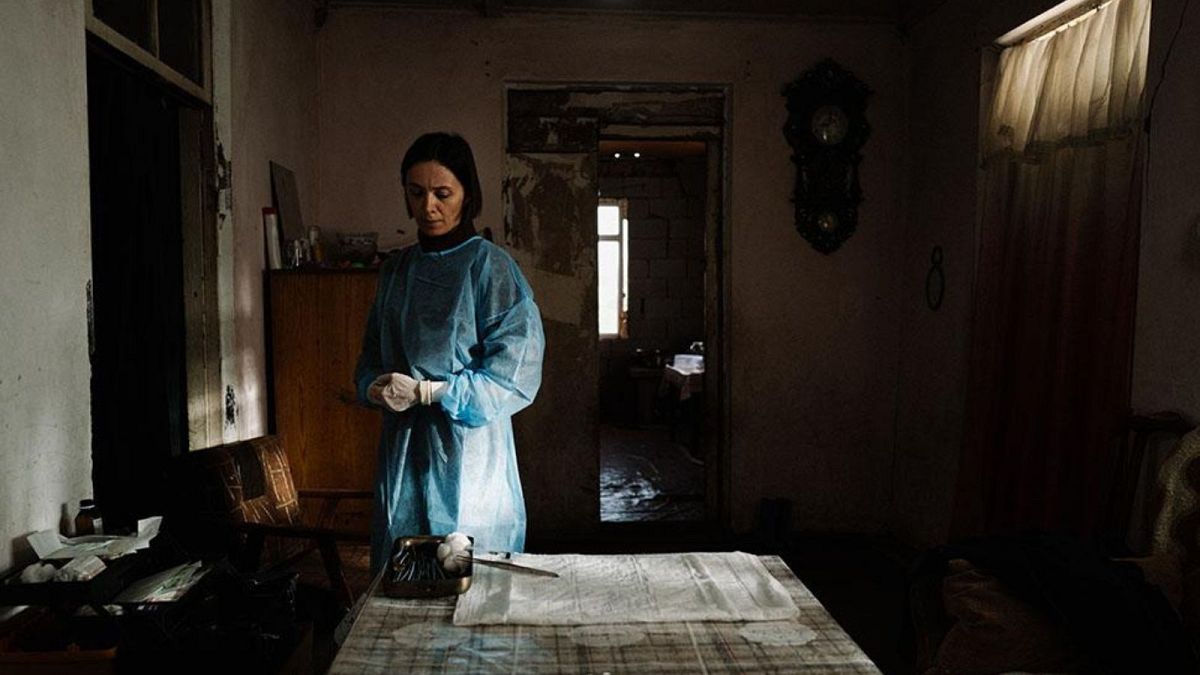A storm-soaked exploration of a female ob-gyn who conducts illegal abortions for women in rural Georgia. It's one of the toughest - but most impactful watches of this year's Venice Film Festival.
From the opening scenes of April, in which a naked woman with sagging skin walks through a pool of pitch blackness, you can feel your emotions start to shiver and squelch, as if you're suddenly stuck in mud.
This is a mood that will persist throughout Georgian filmmaker Dea Kulumbegashvili’s striking and tactilely devastating second feature film, which was produced by fellow 2024 Venice Film Festival contender Luca Guadagnino and follows her 2020 award-winning debut: Beginning.
In the sharp surgical glare of an operating room, we witness a baby die during birth. Nina (Ia Sukhitashvili), an austere and inscrutable obstetrician-gynaecologist, is blamed - leading colleagues to question her professionalism amidst "rumours" she has been performing illegal abortions to locals in rural Georgia. “You’re a murderer”, a doctor says to her as we watch, stuck, in the cold stare of the scene.
But Nina is undeterred in her mission to continue helping women in need, visiting young clients in her spare time with a detached practicality that feels reminiscent in tone of Alan Clarke's 1987 TV movie, Christine, where a girl delivers heroin to drug addicts in her neighbourhood.
Kulumbegashvili never holds back from showing the dehumanising reality of certain situations - namely, the abortion scenes. We're shown subtly heartbreaking details of a client's character - a child-like teddy-bear pyjama top - but the rest is forcefully unforgiving: long takes that trap us in the moment with whimpers off screen, limbs tightening, and the gentle sound of cowbells in the distance - that unfathomable reminder of a world outside continuing as one individual's collapses.
While abortions are legal in Georgia within the first 12 weeks of pregnancy, they can only be performed at specific in-patient medical centres by certified obstetrician-gynaecologists - most of which are in the big cities. This, along with restrictions implemented by Georgia's Ministry of Health in 2023, which include a compulsory five-day waiting period and ultrasound, have left those living in rural parts of the country without easy access to help.
To research the project and character of Nina, Kulumbegashvili and Sukhitashvili reportedly moonlighted in a local maternity ward, attending live births and eventually filming in a makeshift courtyard there.
They also got to know the work ethic and experiences of medical health staff, a profession that carries unimaginable levels of stress yet requires endless empathy and compassion. This is undoubtedly why Nina's character feels so realistic and immersive, fleshed out through such a deep understanding from the filmmaker and actor.
For the most part, we’re inside her perspective: watching long stretches of purple-hued road as she cruises around, looking to pick up random men for casual sex. We often hear her heavy breathing from behind the camera while the perspective sometimes sways, as if on water. There's always a feeling of unsteadiness, of sinking.
This technique also makes the audience feel trapped in a body that they're losing control over, through combining the visceral chaos of stormy nature contrasted with the still nothingness of clinical settings.
Nina's life is one that has been gripped by the pain and tragedy of helping others at their most intimate and terrifying moments, all the while she is struggling to connect with and help herself.
In one scene, she tells her colleague a childhood memory about how her sister was once stuck in mud and almost died. Unable to help, she just sat nearby and cried.
This trauma seems core to how she still feels as a woman continuing to fight against the cruel and oppressive systems that attempt to make her powerless at the cost of peoples' lives - either through society's chastising, or the devastating consequences that occur in the wake of her actions.
In exploring female existence through the lens of pregnancy and abortion, Kulumbegashvili swallows us whole with bodily surrealism; revealing the tactility of one woman's troubled experiences while still recognising her many unknowable parts.
Akin to waking up in the heavy silence of night and feeling extremely aware of your own vulnerabilities, this is far from an easy watch - but it is an incredibly powerful one that give rise to an astonishing new cinematic voice with unparalleled vision.
April premiered at the 81st Venice Film Festival in Competition.

















